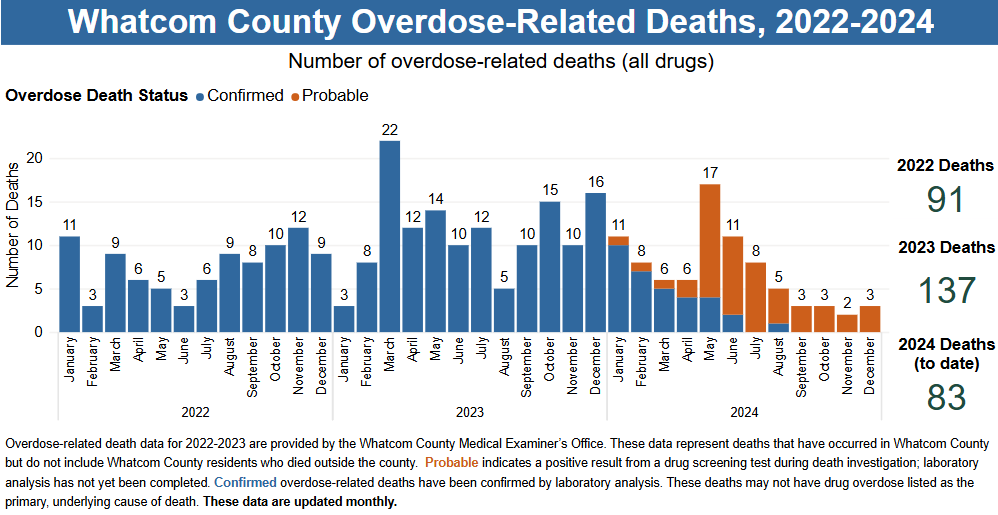Fewer people died from overdoses in Whatcom County in 2024, compared to 2023. While experts hesitate to call the dip in fatalities a trend yet, they say it’s encouraging after a year of countywide efforts tackling the opioid and fentanyl crisis.
Eighty-three people died from suspected overdoses in Whatcom County in 2024, down from 137 deaths in 2023.
In November, only two people died, the lowest monthly fatality number since January 2023.
The data is “preliminary” and “subject to change based on final toxicology reports,” said Amy Harley, a county health officer. And one exact cause is hard to pinpoint. But Harley said, “public health and community action” likely played a “pivotal role.”
“However, too many people are still dying,” she said. “We must, sort of, remain all in, in our response efforts to continue this downward trend.”

The number of emergency department visits for drug overdoses hit a low of 35 in August but has ticked back up since then. Whatcom County EMS reported 1,248 suspected overdoses in 2024, down from 1,459 suspected overdoses in 2023.
Nationwide, Centers for Disease Control data shows a 17% drop in overdose deaths from July 2023 to July 2024. However, state data since August shows a sharp increase in EMS responses and emergency department visits for overdoses, health department Communications Specialist Marie Duckworth said. In King County, overdose deaths nearly doubled since October.
Dr. Shannon Boustead, a Bellingham family medicine doctor who specializes in addiction medicine at Sea Mar, said unknowns in the drug supply make it hard to pinpoint a cause of the shift. He also said a decrease in deaths doesn’t “entail an overall improvement” in individuals’ lives.
“There’s still a lot more to be done to help people with opioid use disorder return to the kind of lives that they want to live,” he said.
Access to naloxone may have helped
This shift downward in overdose deaths comes after Whatcom County and the City of Bellingham both took targeted actions in 2024 to address the growing threat of fentanyl.
Bellingham Mayor Kim Lund issued an executive order in February, establishing a first-responder office on Commercial Street and increasing police presence downtown. In April, Whatcom County Executive Satpal Sidhu issued his own executive order, outlining a suite of actions.
Lund highlighted the city’s efforts to keep illegal substances out of the community in the first place, specifically the work of the Whatcom County Drug Task Force. The Bellingham Police recommitted two officers to the force, which “enhanced law enforcement capacity to combat the sale of drugs in Bellingham specifically, and throughout the region.” Police dogs became certified to detect fentanyl odor.
On Jan. 7, the drug task force arrested 11 people for allegedly dealing drugs in downtown Bellingham, including a primary suspect who was operating out of an RV on Magnolia Street.
Harley said the broad access to naloxone around the county has likely contributed to the decrease in deaths. The health department set up five naloxone kiosks this year and provided naloxone for businesses downtown, said Kari Holley, who works for the county in opioid response and overdose prevention.
Boustead described naloxone, (brand name Narcan), as a “life preserver.”
“When someone is overdosing, it’s like they’re drowning,” he said. “Giving Narcan to them is equivalent to giving them a life preserver which will help them in a moment, but the problem is that there’s no guarantee that just because someone has that life preserver, that they’re actually going to be able to get back on the boat.”
Boustead said it’s common for people in the county to be revived through Narcan after overdosing, and not seek follow-up care. In order to help those people, Boustead said it’s necessary to focus on the barriers to treatment, which include stigma and the challenges of accessing care in a timely manner.
Access to medication and public education
Harley said the health department will continue working to reduce stigma and increase access to treatments for opioid use disorder. Medications like methadone or suboxone can reduce the risk of an overdose by health, decrease withdrawal symptoms and decrease cravings, Harley said.
The Didgwalic Wellness Center Bellingham location with two mobile medical units, expected to open later this year, will significantly increase access to medication.
Efforts at the hospital also direct people to outpatient treatment for access to medication. PeaceHealth St. Joseph Medical Center adopted a program by ScalaNW last fall, which allows staff to call a scheduling line 24/7 to book outpatient appointments.
[ Read more: New PeaceHealth program connects overdose patients to outpatient care ]
Deterrence of new users is also important, Harley said, by educating that any use of street opioids can lead to an overdose.
This year, the health department will be launching a public education campaign around opioid use disorder, funded by opioid funds provided to Whatcom County through the Washington Department of Health.
Mullane Harrington, the program director for behavioral health at the hospital, said she hopes people with addiction feel that their community loves them and wants to help them.
“It’s really important to us that they know that 24 hours a day, they’re going to get the help that they need, because we want them here tomorrow,” she said.
Rachel Lucy, the director of community health at the hospital, said the “collaborative spirit” is high in Whatcom County when addressing substance use disorder. She sits on the county’s Multi-Agency Coordination Group to address the opioid and overdose crisis.
“There’s no competition, and everyone is answering that call of how can we help,” she said, “whether it’s EMS or the county or housing providers or the outpatient clinics, our inpatient staff — it’s just across the board.”
A previous version of this story misspelled Dr. Harley’s name. This story was updated to reflect this change at 1:34 p.m. on Jan. 21, 2025. Cascadia Daily News regrets the error.
Charlotte Alden is CDN’s general assignment/enterprise reporter; reach her at charlottealden@cascadiadaily.com; 360-922-3090 ext. 123.




